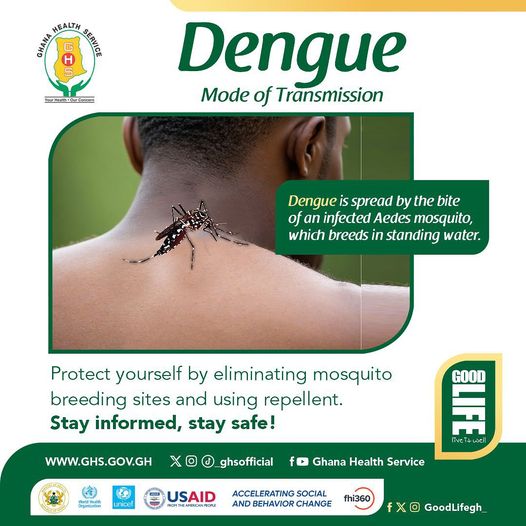Just a few years after conquering the Covi-19 pandemic and some epidemics, another dangerous disease has popped up in some parts of Ghana, causing fear and panic among people living in affected areas.
Recently, some residents and District Chief Executives (DCEs) at the Akyemansa Bloc of the Eastern Region complained about a new breed of mosquitoes that invaded some communities in the Eastern Region.
Despite the complainants appearing to exaggerate the situation, updates within less than a month suggest that this new breed of mosquitoes has truly terrified people.
Some regions of the country reported the identification and confirmation of dengue fever a few weeks ago.
The disease first surfaced in the Eastern Region, affecting residents in the Achiase District, Birim South District, Birim Central Municipality, and Akyemansa.
Initially, the Ghana Health Service (GHS) confirmed that the number of cases of dengue fever was 9. However, reports emerged a few days later, soaring to 11.
Just about 24 hours after the update, the Ghana Health Service reported that the dengue fever cases had shot up to 36, with about 100 suspected cases.
In a few days? How did we get here?
People are already so terrified of the situation that they mistakenly associate normal mosquitoes with these new breeds.
According to the World Health Organization (WHO), dengue (break-bone fever) is a viral infection that spreads from mosquitoes to people. It is more common in tropical and subtropical climates.
WHO says most people who get dengue will not have symptoms, explaining that for those who do, the most common symptoms are high fever, headache, body aches, nausea, and rash.
It also states that most will get better in 1–2 weeks, adding that some people develop severe dengue and need care in a hospital.
WHO also teaches us that in severe cases, dengue can be fatal.
The bite of an infected Aedes mosquito, which breeds in standing water, transmits dengue fever, according to the GHS.
Prevention
The GHS, educating the public on preventive measures, urged the general population, especially those in the affected areas, to prevent mosquito bites by wearing protective clothing and using mosquito repellents.
For those who must keep water containers around their home, GHS advised them to ensure they are tightly covered, adding that they should discard water in containers if the water is not being used.
In addition to the aforementioned, GHS advised farmers to properly dispose of water-collecting containers on their farms, such as empty cocoa pods and coconut shells, by crushing or burying them.
Additionally, it recommended that individuals sleep under insecticide-treated bed nets during the day or outdoors. “Do not self-medicate; report to the nearest health facility when you have a high-grade fever,” GHS stated.
A GHS statement outlined its outbreak-fighting measures.
These include clinicians’ case definition orientation at all levels, including CHPS compounds, meetings with key stakeholders (district health management teams, M/DCES, chiefs, community durbars), and risk communication in the affected districts.
Recently, the GHS noted that “in order to contain the outbreak of dengue and limit the impact on the people in the affected communities, the national team is still on the ground, providing support to the Central Regional Health Directorate. Among the numerous activities conducted today were a review of data on all cases and an update on the Knowledge, Perception, and Attitude Survey conducted in the affected districts, with the aim of tailoring the messages to meet the community’s needs.
Despite the GHS’s on-site interventions, some families in Assin Fosu, in the Central Region, have called to report the emergence of these frightening mosquitoes and the deaths of two of their relatives due to the symptoms.
According to the above account, there is hope that dengue fever will not last long in the communities where it has been confirmed, but the question is: how prepared is the Ghana Health Service or the Health Ministry to contain the situation?
Most Ghanaians have suffered from the one common mosquito disease, malaria, and can tell how painful fighting the disease is.
Even the system hasn’t completely eradicated malaria, so you can only imagine how chaotic things will become if dengue spreads out of control.
The memories of the COVID-19 pandemic and the Marburg Virus Disease (MVD) outbreak, which affected the country’s Ashanti, Savannah, and Western regions, still linger.
While Ghanaians’ health and safety institutions did a commendable job in containing these outbreaks, they hope to channel the same energy into addressing the dengue fever issue.
The fear is that, given the tropical nature of rural communities, the numerous galamsey sites that have caused significant harm to water bodies, and the open drains brimming with refuse, the situation may appear more dire than it actually is.
The GHS is already on the ground in the affected areas to control the situation, according to observations.
However, let us look at those who sleep in slams and those who sleep outside, especially under bridges, on pavements, and in other unauthorized places.
What if the mosquitoes that transmit the virus bite them without these treated bed nets, insecticides, and others?
At this point, the authorities and all stakeholders must act swiftly to provide these items to individuals who may not be able to afford them, in order to curtail or address the cases of dengue fever.
The government must also ensure that education or vibrant sensitization are done to create awareness, especially on preventive measures, before the issues get out of hand.

Ghana| Atinkaonline.com| Porcia Oforiwaa Ofori

























